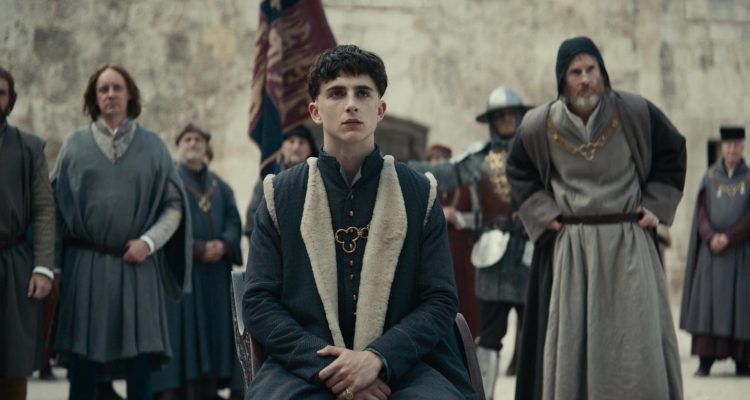It’s really no great stretch to imagine Timothée Chalamet in a historical setting. With his finely angular thinness and flop of dark hair, you can see him as a sickly 19th-century aristocrat, or maybe even…. some rebellious boy prince of medieval England. In David Michôd’s new film for Netflix, “The King,” Chalamet takes on King Henry V, playing him as both callow and haughty; he’s a good king and an arrogant youth by equal measure.
In the early 15th century, England is warring with rebellious factions in Wales and Scotland, as well as the various petty enemies that Henry’s begrudging father (Ben Mendelsohn) has made during his reign. The princeling starts the film as a boozing womanizer with a near-sepulchral complexion, not likely to ascend to the throne since he and his father have a mutual antipathy. But when Henry is unexpectedly crowned the new King of England, the malicious whispers and malign intent of his father’s advisers is overwhelming. He enlists trusted friend and hardened military man Falstaff (a gruff Joel Edgerton) to help him through his early days of rule.
READ MORE: Here are our 15 must-see movies at the 2019 Venice Film Festival
“The King” moves languorously in this first half, at times feeling protracted in its exploration of court backstabbing and internal politics and takes a while to settle into a comfortable pace. But Chalamet’s performance carries us through, and the cast, in general, does well to keep a handle on the specific linguistics of the time. It can’t be easy to smoothly say things like ‘desist from this timorous slither,’ but there’s something satisfying about seeing it pulled off.
Maintaining fidelity to Shakespeare’s themes without adhering slavishly to the play’s text or history textbooks, Michôd and co-writer/star Edgerton attempt to bring history to a contemporary audience, and given the already-remote 15th-century manners of the story, it’s probably wise that they’ve worked to make it accessible to audiences. Given Chalamet’s huge popularity, it may be that his role in the film brings younger viewers to an otherwise obscure past, something Michôd himself noted about casting young actors in the roles.
In a court grown used to war, Henry tries for peace — only to rumble the specter of war with France. As the film moves inevitably toward the legendary Battle of Agincourt, it picks up momentum. It’s a solid chunk of time before we meet King Henry’s foe in the form of the Dauphin of France, with a deliciously nasty turn from Robert Pattinson. The characterization is borderline ridiculous, but also a pretty fantastic source of comic relief; his grandstanding insults toward the English King vacillate from detailed physical threat to the size of his manhood. There are a few occasions for tart verbal humor in the film, underlining the solemnity of most historical epics like these and making “The King” seem much more fleet-footed by comparison.
Visually the film is really is at its most remarkable. The shadowplay across vaulted castle windows and dirty medieval villages is painterly at times, with a depth to the colors that recalls Bruegel. The dramatic and aesthetic peak of the film has to be the Battle at Agincourt, where a vastly outnumbered English army faces the French, using the muddy fields to their tactical advantage. The muck and mire of the scene to follow is hellishly striking, men indistinguishable from the mud itself, drowning and bleeding on the ground as the clanging, chaotic soundscape of battle envelops them. Staged at an epic scope with extras and practical effects, this extended scene feels like old-fashioned filmmaking in the best possible way.
Exploring ideas of political truth versus perception, the ways in which lies are sold as truths, the justifications for war, and the ways that good leaders must conceal and crush in equal helpings, there’s plenty within to draw parallels to modern-day issues. Thankfully, Michôd is wise enough to let us work it out on our own, sparing us from any clunky statements of intent. In spite of all the reasons that this film should have been another “Outlaw King” – silly and self-important – it manages to cleverly duck and dive around nearly all of them. It’s a feat that speaks to the deftness and intelligence of the approach that Michôd and Edgerton take with their writing and direction, giving us an epic period piece that actually fulfills much of that ambition. [A-]
Click here to read more of our coverage from the 2019 edition of the Venice Film Festival.

